Entrepreneurship: Theories and Practices
VerifiedAdded on 2020/06/03
|15
|4564
|115
AI Summary
This assignment requires students to delve into the field of entrepreneurship, analyzing both theoretical frameworks and practical applications. It encourages a critical examination of key concepts such as entrepreneurship education, institutional theory, social entrepreneurship, business models, and the impact of entrepreneurship on economic development. The readings provided offer diverse perspectives on these topics, prompting students to synthesize information and develop their understanding of contemporary entrepreneurial challenges and opportunities.
Contribute Materials
Your contribution can guide someone’s learning journey. Share your
documents today.

ENTREPRENEURSHIP
Secure Best Marks with AI Grader
Need help grading? Try our AI Grader for instant feedback on your assignments.
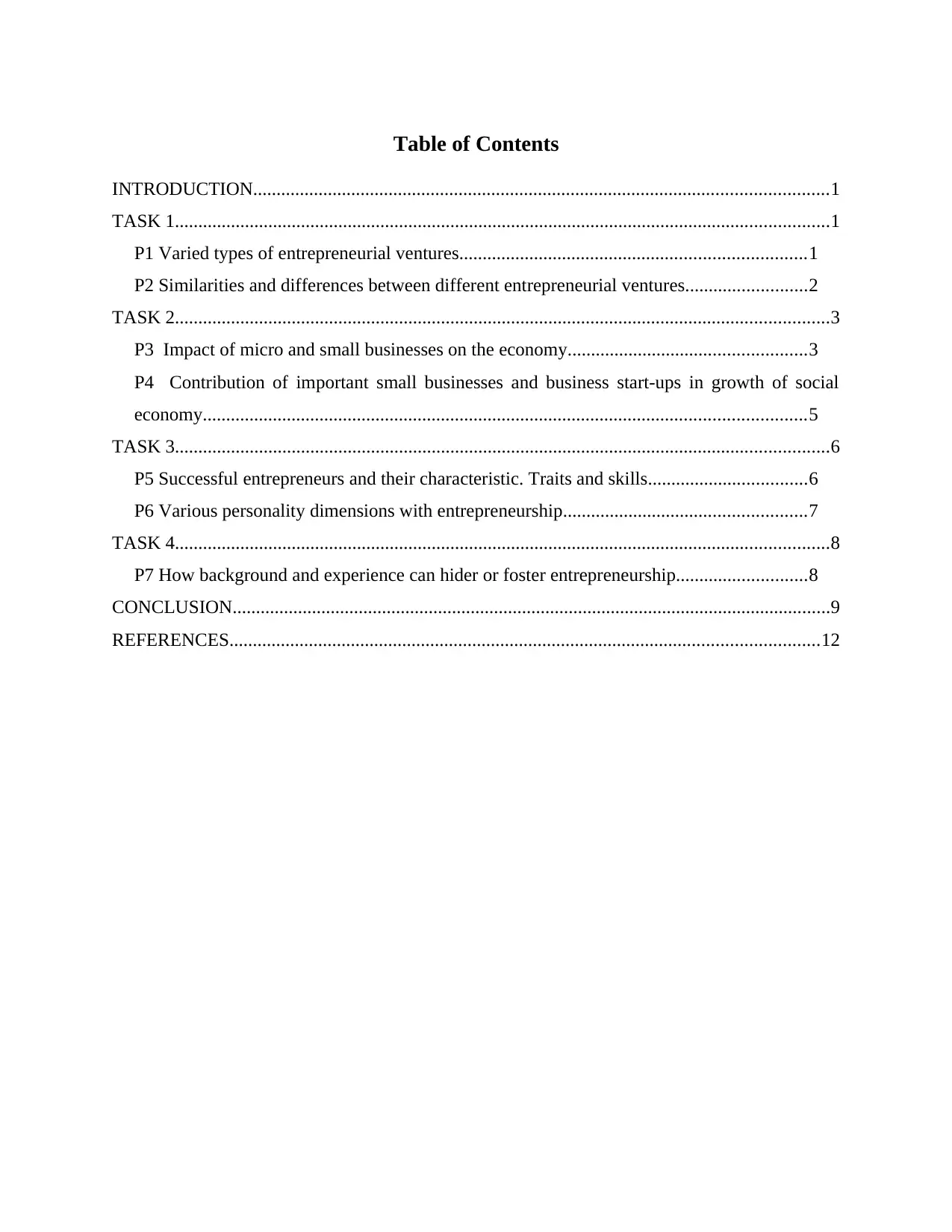
Table of Contents
INTRODUCTION...........................................................................................................................1
TASK 1............................................................................................................................................1
P1 Varied types of entrepreneurial ventures..........................................................................1
P2 Similarities and differences between different entrepreneurial ventures..........................2
TASK 2............................................................................................................................................3
P3 Impact of micro and small businesses on the economy...................................................3
P4 Contribution of important small businesses and business start-ups in growth of social
economy.................................................................................................................................5
TASK 3............................................................................................................................................6
P5 Successful entrepreneurs and their characteristic. Traits and skills..................................6
P6 Various personality dimensions with entrepreneurship....................................................7
TASK 4............................................................................................................................................8
P7 How background and experience can hider or foster entrepreneurship............................8
CONCLUSION................................................................................................................................9
REFERENCES..............................................................................................................................12
INTRODUCTION...........................................................................................................................1
TASK 1............................................................................................................................................1
P1 Varied types of entrepreneurial ventures..........................................................................1
P2 Similarities and differences between different entrepreneurial ventures..........................2
TASK 2............................................................................................................................................3
P3 Impact of micro and small businesses on the economy...................................................3
P4 Contribution of important small businesses and business start-ups in growth of social
economy.................................................................................................................................5
TASK 3............................................................................................................................................6
P5 Successful entrepreneurs and their characteristic. Traits and skills..................................6
P6 Various personality dimensions with entrepreneurship....................................................7
TASK 4............................................................................................................................................8
P7 How background and experience can hider or foster entrepreneurship............................8
CONCLUSION................................................................................................................................9
REFERENCES..............................................................................................................................12

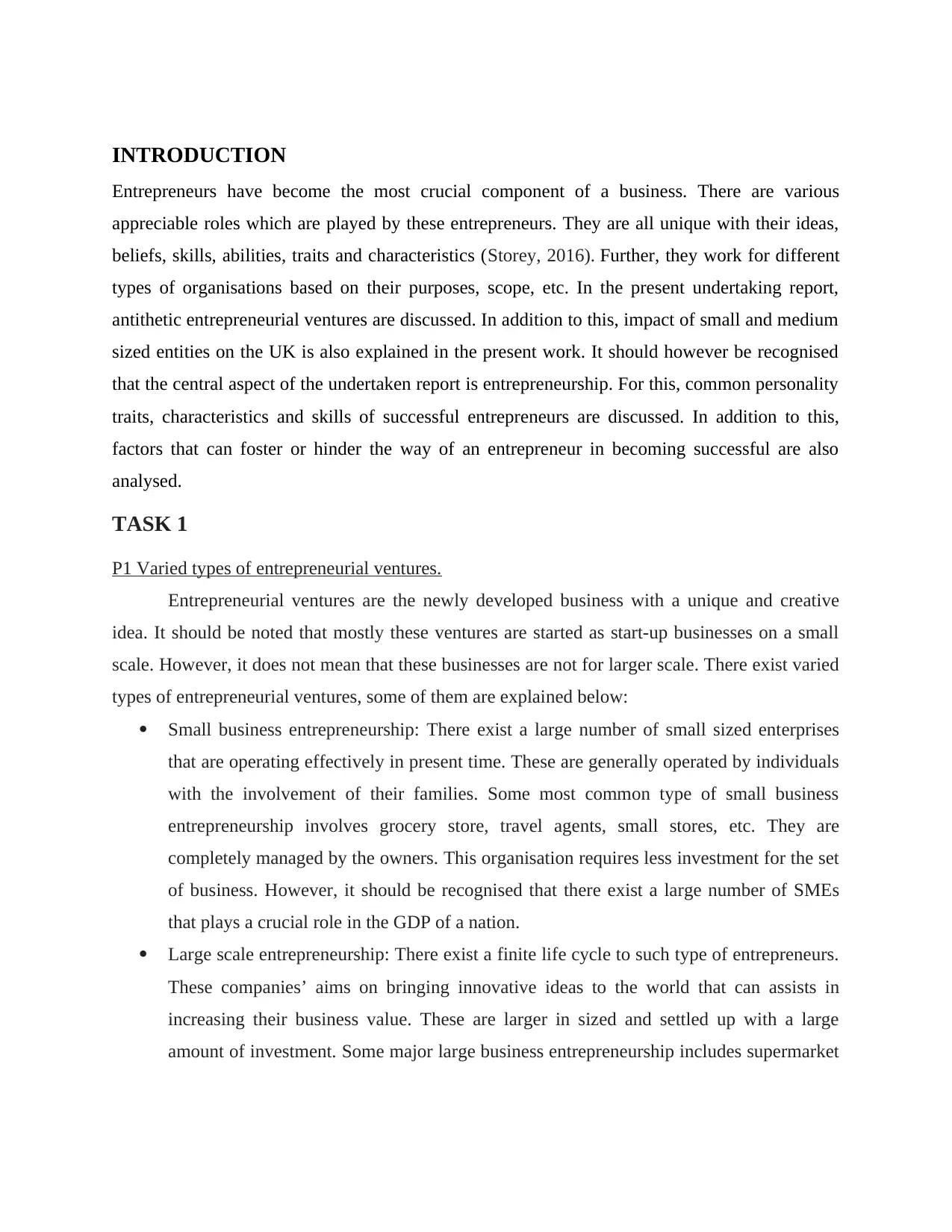
INTRODUCTION
Entrepreneurs have become the most crucial component of a business. There are various
appreciable roles which are played by these entrepreneurs. They are all unique with their ideas,
beliefs, skills, abilities, traits and characteristics (Storey, 2016). Further, they work for different
types of organisations based on their purposes, scope, etc. In the present undertaking report,
antithetic entrepreneurial ventures are discussed. In addition to this, impact of small and medium
sized entities on the UK is also explained in the present work. It should however be recognised
that the central aspect of the undertaken report is entrepreneurship. For this, common personality
traits, characteristics and skills of successful entrepreneurs are discussed. In addition to this,
factors that can foster or hinder the way of an entrepreneur in becoming successful are also
analysed.
TASK 1
P1 Varied types of entrepreneurial ventures.
Entrepreneurial ventures are the newly developed business with a unique and creative
idea. It should be noted that mostly these ventures are started as start-up businesses on a small
scale. However, it does not mean that these businesses are not for larger scale. There exist varied
types of entrepreneurial ventures, some of them are explained below:
Small business entrepreneurship: There exist a large number of small sized enterprises
that are operating effectively in present time. These are generally operated by individuals
with the involvement of their families. Some most common type of small business
entrepreneurship involves grocery store, travel agents, small stores, etc. They are
completely managed by the owners. This organisation requires less investment for the set
of business. However, it should be recognised that there exist a large number of SMEs
that plays a crucial role in the GDP of a nation.
Large scale entrepreneurship: There exist a finite life cycle to such type of entrepreneurs.
These companies’ aims on bringing innovative ideas to the world that can assists in
increasing their business value. These are larger in sized and settled up with a large
amount of investment. Some major large business entrepreneurship includes supermarket
Entrepreneurs have become the most crucial component of a business. There are various
appreciable roles which are played by these entrepreneurs. They are all unique with their ideas,
beliefs, skills, abilities, traits and characteristics (Storey, 2016). Further, they work for different
types of organisations based on their purposes, scope, etc. In the present undertaking report,
antithetic entrepreneurial ventures are discussed. In addition to this, impact of small and medium
sized entities on the UK is also explained in the present work. It should however be recognised
that the central aspect of the undertaken report is entrepreneurship. For this, common personality
traits, characteristics and skills of successful entrepreneurs are discussed. In addition to this,
factors that can foster or hinder the way of an entrepreneur in becoming successful are also
analysed.
TASK 1
P1 Varied types of entrepreneurial ventures.
Entrepreneurial ventures are the newly developed business with a unique and creative
idea. It should be noted that mostly these ventures are started as start-up businesses on a small
scale. However, it does not mean that these businesses are not for larger scale. There exist varied
types of entrepreneurial ventures, some of them are explained below:
Small business entrepreneurship: There exist a large number of small sized enterprises
that are operating effectively in present time. These are generally operated by individuals
with the involvement of their families. Some most common type of small business
entrepreneurship involves grocery store, travel agents, small stores, etc. They are
completely managed by the owners. This organisation requires less investment for the set
of business. However, it should be recognised that there exist a large number of SMEs
that plays a crucial role in the GDP of a nation.
Large scale entrepreneurship: There exist a finite life cycle to such type of entrepreneurs.
These companies’ aims on bringing innovative ideas to the world that can assists in
increasing their business value. These are larger in sized and settled up with a large
amount of investment. Some major large business entrepreneurship includes supermarket
Secure Best Marks with AI Grader
Need help grading? Try our AI Grader for instant feedback on your assignments.
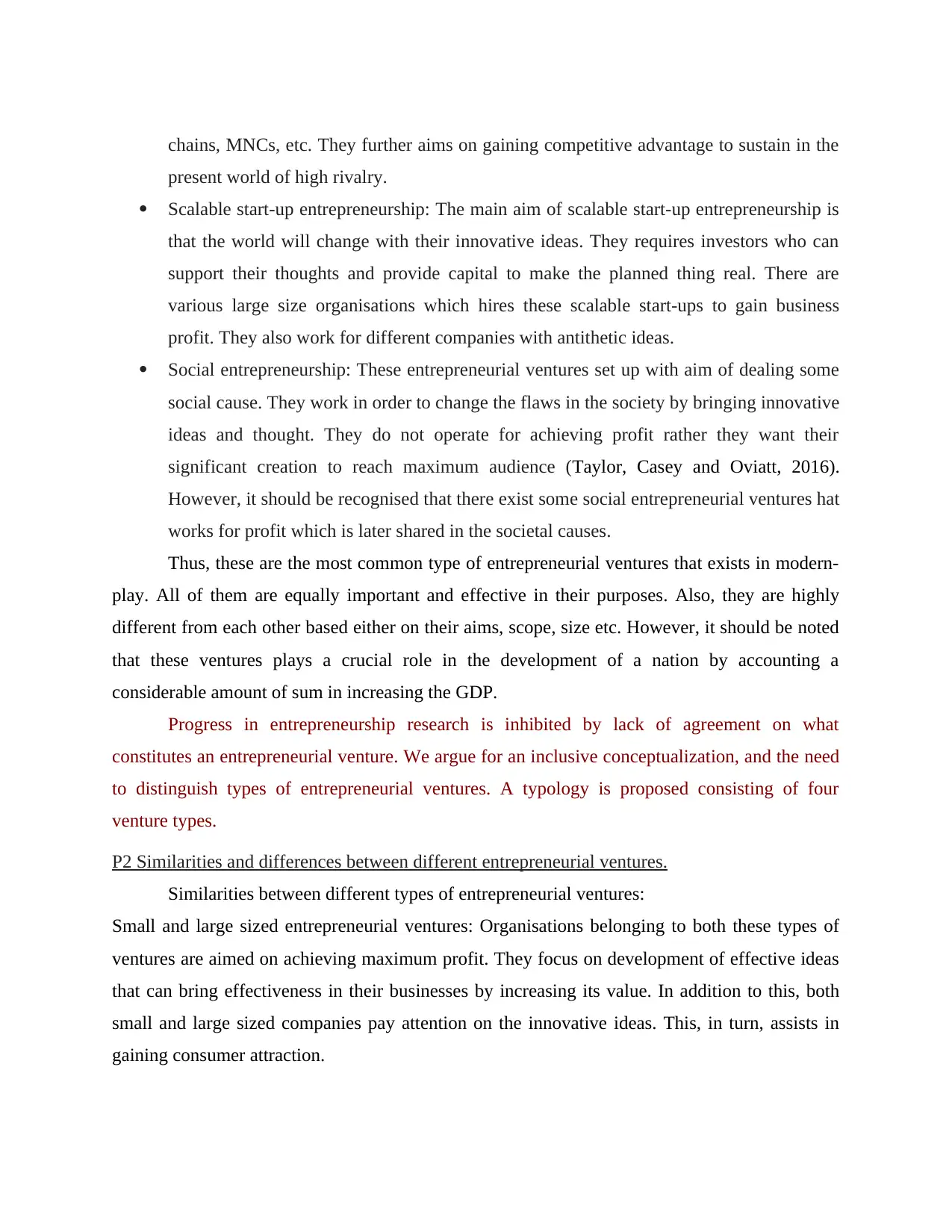
chains, MNCs, etc. They further aims on gaining competitive advantage to sustain in the
present world of high rivalry.
Scalable start-up entrepreneurship: The main aim of scalable start-up entrepreneurship is
that the world will change with their innovative ideas. They requires investors who can
support their thoughts and provide capital to make the planned thing real. There are
various large size organisations which hires these scalable start-ups to gain business
profit. They also work for different companies with antithetic ideas.
Social entrepreneurship: These entrepreneurial ventures set up with aim of dealing some
social cause. They work in order to change the flaws in the society by bringing innovative
ideas and thought. They do not operate for achieving profit rather they want their
significant creation to reach maximum audience (Taylor, Casey and Oviatt, 2016).
However, it should be recognised that there exist some social entrepreneurial ventures hat
works for profit which is later shared in the societal causes.
Thus, these are the most common type of entrepreneurial ventures that exists in modern-
play. All of them are equally important and effective in their purposes. Also, they are highly
different from each other based either on their aims, scope, size etc. However, it should be noted
that these ventures plays a crucial role in the development of a nation by accounting a
considerable amount of sum in increasing the GDP.
Progress in entrepreneurship research is inhibited by lack of agreement on what
constitutes an entrepreneurial venture. We argue for an inclusive conceptualization, and the need
to distinguish types of entrepreneurial ventures. A typology is proposed consisting of four
venture types.
P2 Similarities and differences between different entrepreneurial ventures.
Similarities between different types of entrepreneurial ventures:
Small and large sized entrepreneurial ventures: Organisations belonging to both these types of
ventures are aimed on achieving maximum profit. They focus on development of effective ideas
that can bring effectiveness in their businesses by increasing its value. In addition to this, both
small and large sized companies pay attention on the innovative ideas. This, in turn, assists in
gaining consumer attraction.
present world of high rivalry.
Scalable start-up entrepreneurship: The main aim of scalable start-up entrepreneurship is
that the world will change with their innovative ideas. They requires investors who can
support their thoughts and provide capital to make the planned thing real. There are
various large size organisations which hires these scalable start-ups to gain business
profit. They also work for different companies with antithetic ideas.
Social entrepreneurship: These entrepreneurial ventures set up with aim of dealing some
social cause. They work in order to change the flaws in the society by bringing innovative
ideas and thought. They do not operate for achieving profit rather they want their
significant creation to reach maximum audience (Taylor, Casey and Oviatt, 2016).
However, it should be recognised that there exist some social entrepreneurial ventures hat
works for profit which is later shared in the societal causes.
Thus, these are the most common type of entrepreneurial ventures that exists in modern-
play. All of them are equally important and effective in their purposes. Also, they are highly
different from each other based either on their aims, scope, size etc. However, it should be noted
that these ventures plays a crucial role in the development of a nation by accounting a
considerable amount of sum in increasing the GDP.
Progress in entrepreneurship research is inhibited by lack of agreement on what
constitutes an entrepreneurial venture. We argue for an inclusive conceptualization, and the need
to distinguish types of entrepreneurial ventures. A typology is proposed consisting of four
venture types.
P2 Similarities and differences between different entrepreneurial ventures.
Similarities between different types of entrepreneurial ventures:
Small and large sized entrepreneurial ventures: Organisations belonging to both these types of
ventures are aimed on achieving maximum profit. They focus on development of effective ideas
that can bring effectiveness in their businesses by increasing its value. In addition to this, both
small and large sized companies pay attention on the innovative ideas. This, in turn, assists in
gaining consumer attraction.
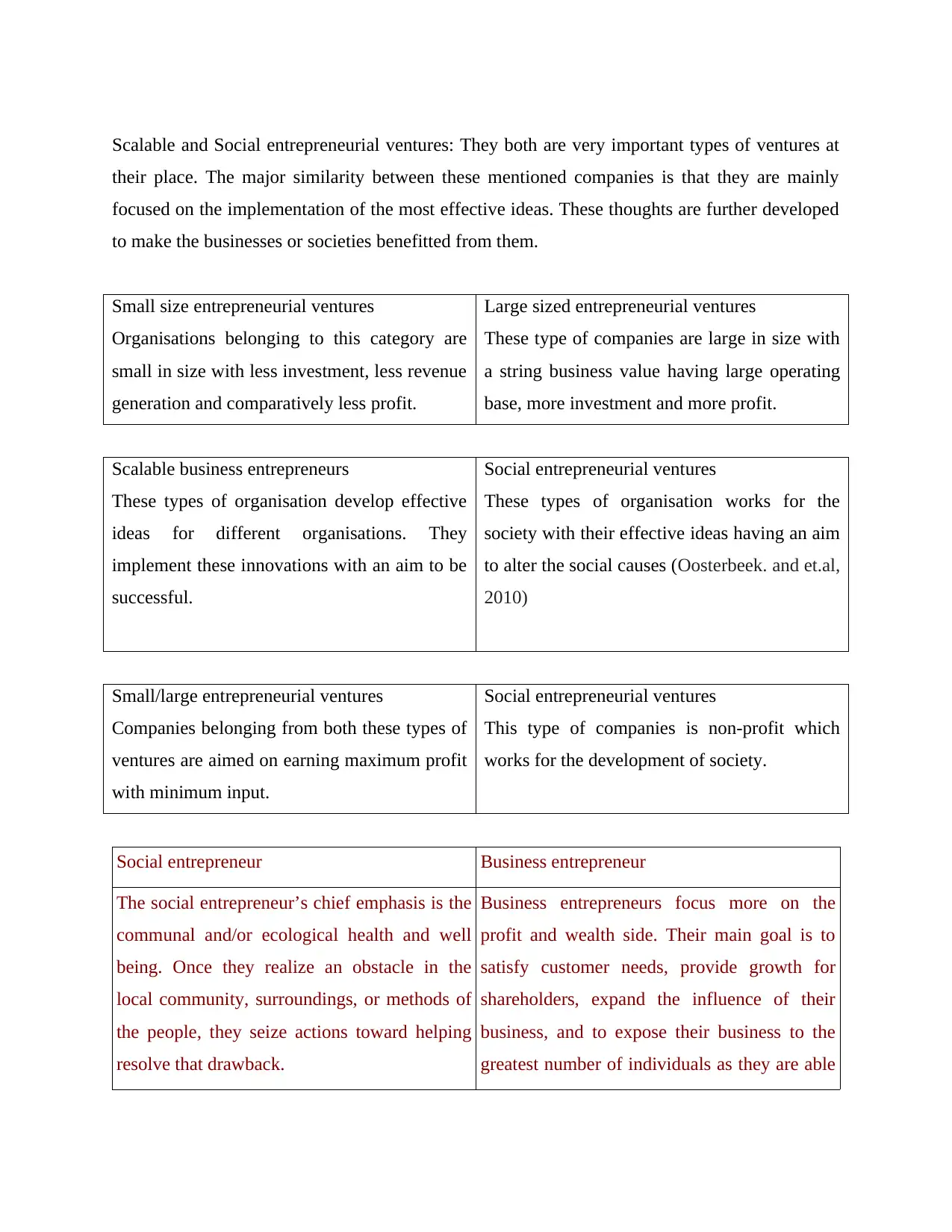
Scalable and Social entrepreneurial ventures: They both are very important types of ventures at
their place. The major similarity between these mentioned companies is that they are mainly
focused on the implementation of the most effective ideas. These thoughts are further developed
to make the businesses or societies benefitted from them.
Small size entrepreneurial ventures
Organisations belonging to this category are
small in size with less investment, less revenue
generation and comparatively less profit.
Large sized entrepreneurial ventures
These type of companies are large in size with
a string business value having large operating
base, more investment and more profit.
Scalable business entrepreneurs
These types of organisation develop effective
ideas for different organisations. They
implement these innovations with an aim to be
successful.
Social entrepreneurial ventures
These types of organisation works for the
society with their effective ideas having an aim
to alter the social causes (Oosterbeek. and et.al,
2010)
Small/large entrepreneurial ventures
Companies belonging from both these types of
ventures are aimed on earning maximum profit
with minimum input.
Social entrepreneurial ventures
This type of companies is non-profit which
works for the development of society.
Social entrepreneur Business entrepreneur
The social entrepreneur’s chief emphasis is the
communal and/or ecological health and well
being. Once they realize an obstacle in the
local community, surroundings, or methods of
the people, they seize actions toward helping
resolve that drawback.
Business entrepreneurs focus more on the
profit and wealth side. Their main goal is to
satisfy customer needs, provide growth for
shareholders, expand the influence of their
business, and to expose their business to the
greatest number of individuals as they are able
their place. The major similarity between these mentioned companies is that they are mainly
focused on the implementation of the most effective ideas. These thoughts are further developed
to make the businesses or societies benefitted from them.
Small size entrepreneurial ventures
Organisations belonging to this category are
small in size with less investment, less revenue
generation and comparatively less profit.
Large sized entrepreneurial ventures
These type of companies are large in size with
a string business value having large operating
base, more investment and more profit.
Scalable business entrepreneurs
These types of organisation develop effective
ideas for different organisations. They
implement these innovations with an aim to be
successful.
Social entrepreneurial ventures
These types of organisation works for the
society with their effective ideas having an aim
to alter the social causes (Oosterbeek. and et.al,
2010)
Small/large entrepreneurial ventures
Companies belonging from both these types of
ventures are aimed on earning maximum profit
with minimum input.
Social entrepreneurial ventures
This type of companies is non-profit which
works for the development of society.
Social entrepreneur Business entrepreneur
The social entrepreneur’s chief emphasis is the
communal and/or ecological health and well
being. Once they realize an obstacle in the
local community, surroundings, or methods of
the people, they seize actions toward helping
resolve that drawback.
Business entrepreneurs focus more on the
profit and wealth side. Their main goal is to
satisfy customer needs, provide growth for
shareholders, expand the influence of their
business, and to expose their business to the
greatest number of individuals as they are able
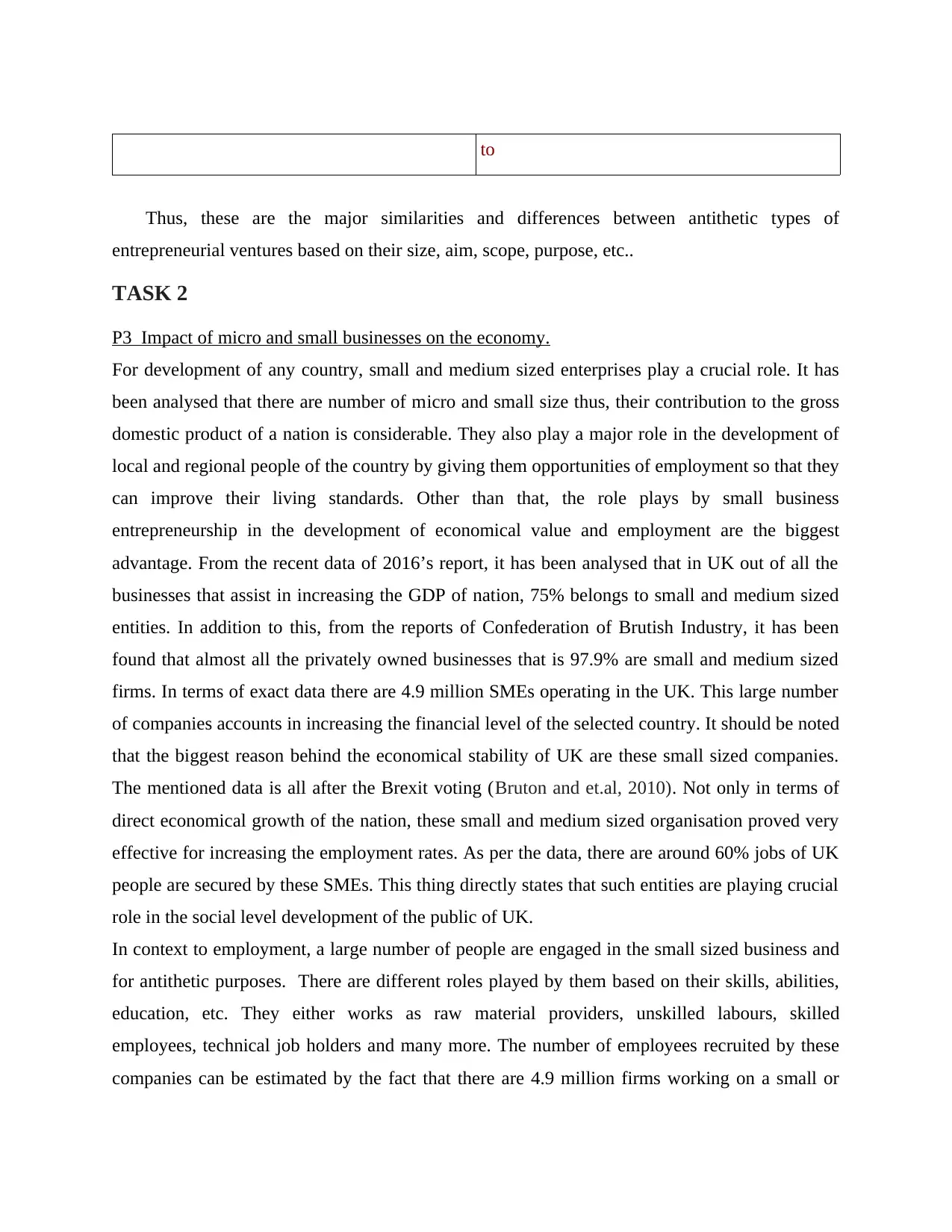
to
Thus, these are the major similarities and differences between antithetic types of
entrepreneurial ventures based on their size, aim, scope, purpose, etc..
TASK 2
P3 Impact of micro and small businesses on the economy.
For development of any country, small and medium sized enterprises play a crucial role. It has
been analysed that there are number of micro and small size thus, their contribution to the gross
domestic product of a nation is considerable. They also play a major role in the development of
local and regional people of the country by giving them opportunities of employment so that they
can improve their living standards. Other than that, the role plays by small business
entrepreneurship in the development of economical value and employment are the biggest
advantage. From the recent data of 2016’s report, it has been analysed that in UK out of all the
businesses that assist in increasing the GDP of nation, 75% belongs to small and medium sized
entities. In addition to this, from the reports of Confederation of Brutish Industry, it has been
found that almost all the privately owned businesses that is 97.9% are small and medium sized
firms. In terms of exact data there are 4.9 million SMEs operating in the UK. This large number
of companies accounts in increasing the financial level of the selected country. It should be noted
that the biggest reason behind the economical stability of UK are these small sized companies.
The mentioned data is all after the Brexit voting (Bruton and et.al, 2010). Not only in terms of
direct economical growth of the nation, these small and medium sized organisation proved very
effective for increasing the employment rates. As per the data, there are around 60% jobs of UK
people are secured by these SMEs. This thing directly states that such entities are playing crucial
role in the social level development of the public of UK.
In context to employment, a large number of people are engaged in the small sized business and
for antithetic purposes. There are different roles played by them based on their skills, abilities,
education, etc. They either works as raw material providers, unskilled labours, skilled
employees, technical job holders and many more. The number of employees recruited by these
companies can be estimated by the fact that there are 4.9 million firms working on a small or
Thus, these are the major similarities and differences between antithetic types of
entrepreneurial ventures based on their size, aim, scope, purpose, etc..
TASK 2
P3 Impact of micro and small businesses on the economy.
For development of any country, small and medium sized enterprises play a crucial role. It has
been analysed that there are number of micro and small size thus, their contribution to the gross
domestic product of a nation is considerable. They also play a major role in the development of
local and regional people of the country by giving them opportunities of employment so that they
can improve their living standards. Other than that, the role plays by small business
entrepreneurship in the development of economical value and employment are the biggest
advantage. From the recent data of 2016’s report, it has been analysed that in UK out of all the
businesses that assist in increasing the GDP of nation, 75% belongs to small and medium sized
entities. In addition to this, from the reports of Confederation of Brutish Industry, it has been
found that almost all the privately owned businesses that is 97.9% are small and medium sized
firms. In terms of exact data there are 4.9 million SMEs operating in the UK. This large number
of companies accounts in increasing the financial level of the selected country. It should be noted
that the biggest reason behind the economical stability of UK are these small sized companies.
The mentioned data is all after the Brexit voting (Bruton and et.al, 2010). Not only in terms of
direct economical growth of the nation, these small and medium sized organisation proved very
effective for increasing the employment rates. As per the data, there are around 60% jobs of UK
people are secured by these SMEs. This thing directly states that such entities are playing crucial
role in the social level development of the public of UK.
In context to employment, a large number of people are engaged in the small sized business and
for antithetic purposes. There are different roles played by them based on their skills, abilities,
education, etc. They either works as raw material providers, unskilled labours, skilled
employees, technical job holders and many more. The number of employees recruited by these
companies can be estimated by the fact that there are 4.9 million firms working on a small or
Paraphrase This Document
Need a fresh take? Get an instant paraphrase of this document with our AI Paraphraser
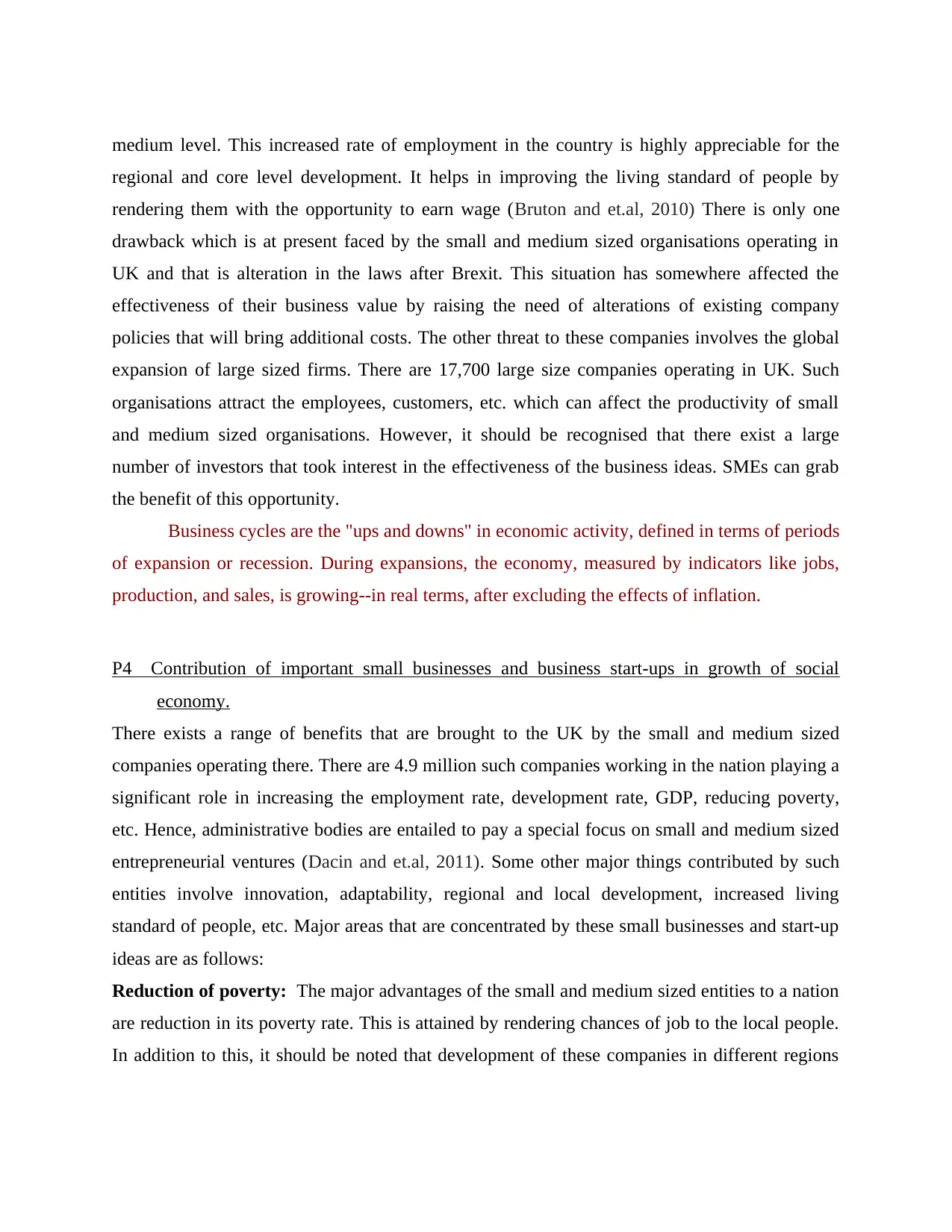
medium level. This increased rate of employment in the country is highly appreciable for the
regional and core level development. It helps in improving the living standard of people by
rendering them with the opportunity to earn wage (Bruton and et.al, 2010) There is only one
drawback which is at present faced by the small and medium sized organisations operating in
UK and that is alteration in the laws after Brexit. This situation has somewhere affected the
effectiveness of their business value by raising the need of alterations of existing company
policies that will bring additional costs. The other threat to these companies involves the global
expansion of large sized firms. There are 17,700 large size companies operating in UK. Such
organisations attract the employees, customers, etc. which can affect the productivity of small
and medium sized organisations. However, it should be recognised that there exist a large
number of investors that took interest in the effectiveness of the business ideas. SMEs can grab
the benefit of this opportunity.
Business cycles are the "ups and downs" in economic activity, defined in terms of periods
of expansion or recession. During expansions, the economy, measured by indicators like jobs,
production, and sales, is growing--in real terms, after excluding the effects of inflation.
P4 Contribution of important small businesses and business start-ups in growth of social
economy.
There exists a range of benefits that are brought to the UK by the small and medium sized
companies operating there. There are 4.9 million such companies working in the nation playing a
significant role in increasing the employment rate, development rate, GDP, reducing poverty,
etc. Hence, administrative bodies are entailed to pay a special focus on small and medium sized
entrepreneurial ventures (Dacin and et.al, 2011). Some other major things contributed by such
entities involve innovation, adaptability, regional and local development, increased living
standard of people, etc. Major areas that are concentrated by these small businesses and start-up
ideas are as follows:
Reduction of poverty: The major advantages of the small and medium sized entities to a nation
are reduction in its poverty rate. This is attained by rendering chances of job to the local people.
In addition to this, it should be noted that development of these companies in different regions
regional and core level development. It helps in improving the living standard of people by
rendering them with the opportunity to earn wage (Bruton and et.al, 2010) There is only one
drawback which is at present faced by the small and medium sized organisations operating in
UK and that is alteration in the laws after Brexit. This situation has somewhere affected the
effectiveness of their business value by raising the need of alterations of existing company
policies that will bring additional costs. The other threat to these companies involves the global
expansion of large sized firms. There are 17,700 large size companies operating in UK. Such
organisations attract the employees, customers, etc. which can affect the productivity of small
and medium sized organisations. However, it should be recognised that there exist a large
number of investors that took interest in the effectiveness of the business ideas. SMEs can grab
the benefit of this opportunity.
Business cycles are the "ups and downs" in economic activity, defined in terms of periods
of expansion or recession. During expansions, the economy, measured by indicators like jobs,
production, and sales, is growing--in real terms, after excluding the effects of inflation.
P4 Contribution of important small businesses and business start-ups in growth of social
economy.
There exists a range of benefits that are brought to the UK by the small and medium sized
companies operating there. There are 4.9 million such companies working in the nation playing a
significant role in increasing the employment rate, development rate, GDP, reducing poverty,
etc. Hence, administrative bodies are entailed to pay a special focus on small and medium sized
entrepreneurial ventures (Dacin and et.al, 2011). Some other major things contributed by such
entities involve innovation, adaptability, regional and local development, increased living
standard of people, etc. Major areas that are concentrated by these small businesses and start-up
ideas are as follows:
Reduction of poverty: The major advantages of the small and medium sized entities to a nation
are reduction in its poverty rate. This is attained by rendering chances of job to the local people.
In addition to this, it should be noted that development of these companies in different regions
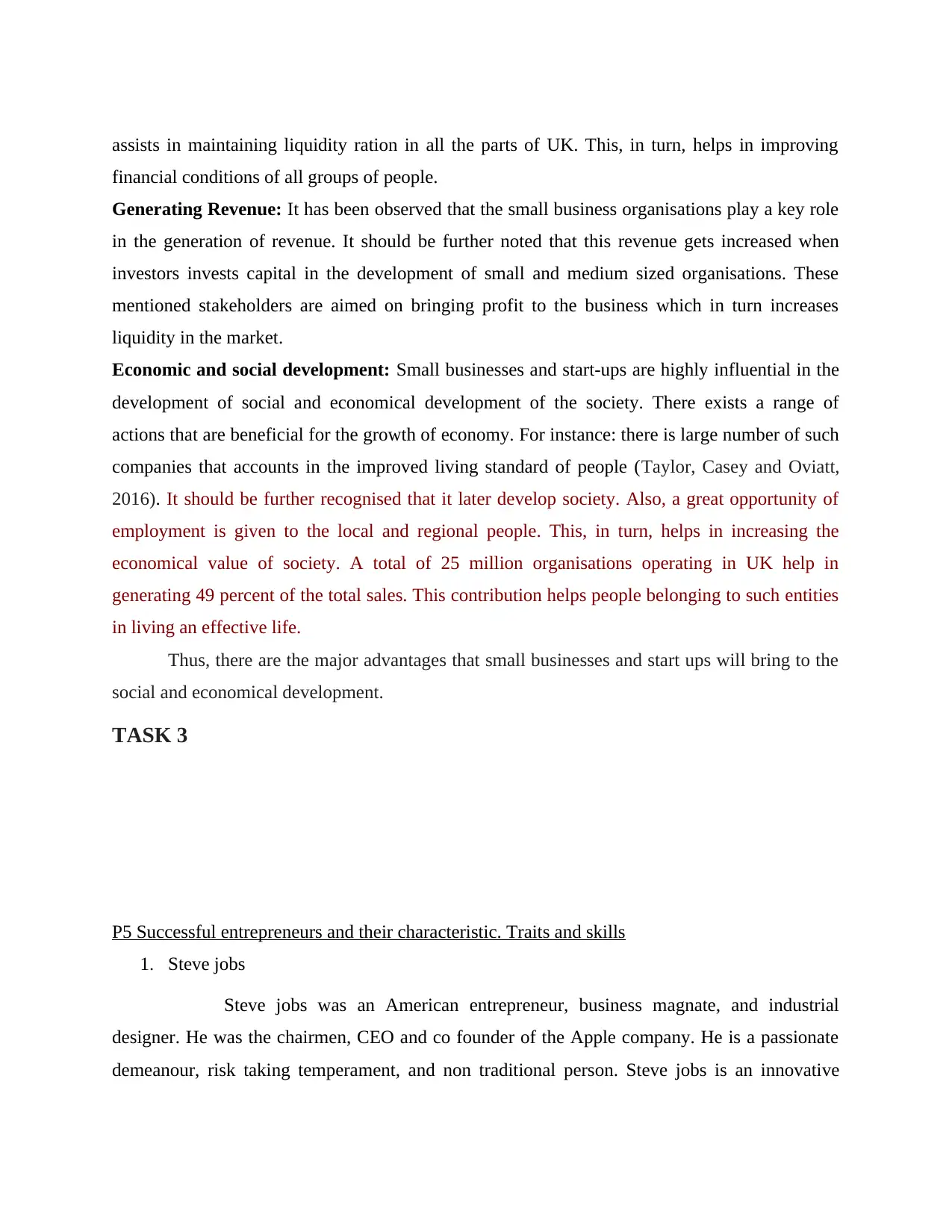
assists in maintaining liquidity ration in all the parts of UK. This, in turn, helps in improving
financial conditions of all groups of people.
Generating Revenue: It has been observed that the small business organisations play a key role
in the generation of revenue. It should be further noted that this revenue gets increased when
investors invests capital in the development of small and medium sized organisations. These
mentioned stakeholders are aimed on bringing profit to the business which in turn increases
liquidity in the market.
Economic and social development: Small businesses and start-ups are highly influential in the
development of social and economical development of the society. There exists a range of
actions that are beneficial for the growth of economy. For instance: there is large number of such
companies that accounts in the improved living standard of people (Taylor, Casey and Oviatt,
2016). It should be further recognised that it later develop society. Also, a great opportunity of
employment is given to the local and regional people. This, in turn, helps in increasing the
economical value of society. A total of 25 million organisations operating in UK help in
generating 49 percent of the total sales. This contribution helps people belonging to such entities
in living an effective life.
Thus, there are the major advantages that small businesses and start ups will bring to the
social and economical development.
TASK 3
P5 Successful entrepreneurs and their characteristic. Traits and skills
1. Steve jobs
Steve jobs was an American entrepreneur, business magnate, and industrial
designer. He was the chairmen, CEO and co founder of the Apple company. He is a passionate
demeanour, risk taking temperament, and non traditional person. Steve jobs is an innovative
financial conditions of all groups of people.
Generating Revenue: It has been observed that the small business organisations play a key role
in the generation of revenue. It should be further noted that this revenue gets increased when
investors invests capital in the development of small and medium sized organisations. These
mentioned stakeholders are aimed on bringing profit to the business which in turn increases
liquidity in the market.
Economic and social development: Small businesses and start-ups are highly influential in the
development of social and economical development of the society. There exists a range of
actions that are beneficial for the growth of economy. For instance: there is large number of such
companies that accounts in the improved living standard of people (Taylor, Casey and Oviatt,
2016). It should be further recognised that it later develop society. Also, a great opportunity of
employment is given to the local and regional people. This, in turn, helps in increasing the
economical value of society. A total of 25 million organisations operating in UK help in
generating 49 percent of the total sales. This contribution helps people belonging to such entities
in living an effective life.
Thus, there are the major advantages that small businesses and start ups will bring to the
social and economical development.
TASK 3
P5 Successful entrepreneurs and their characteristic. Traits and skills
1. Steve jobs
Steve jobs was an American entrepreneur, business magnate, and industrial
designer. He was the chairmen, CEO and co founder of the Apple company. He is a passionate
demeanour, risk taking temperament, and non traditional person. Steve jobs is an innovative
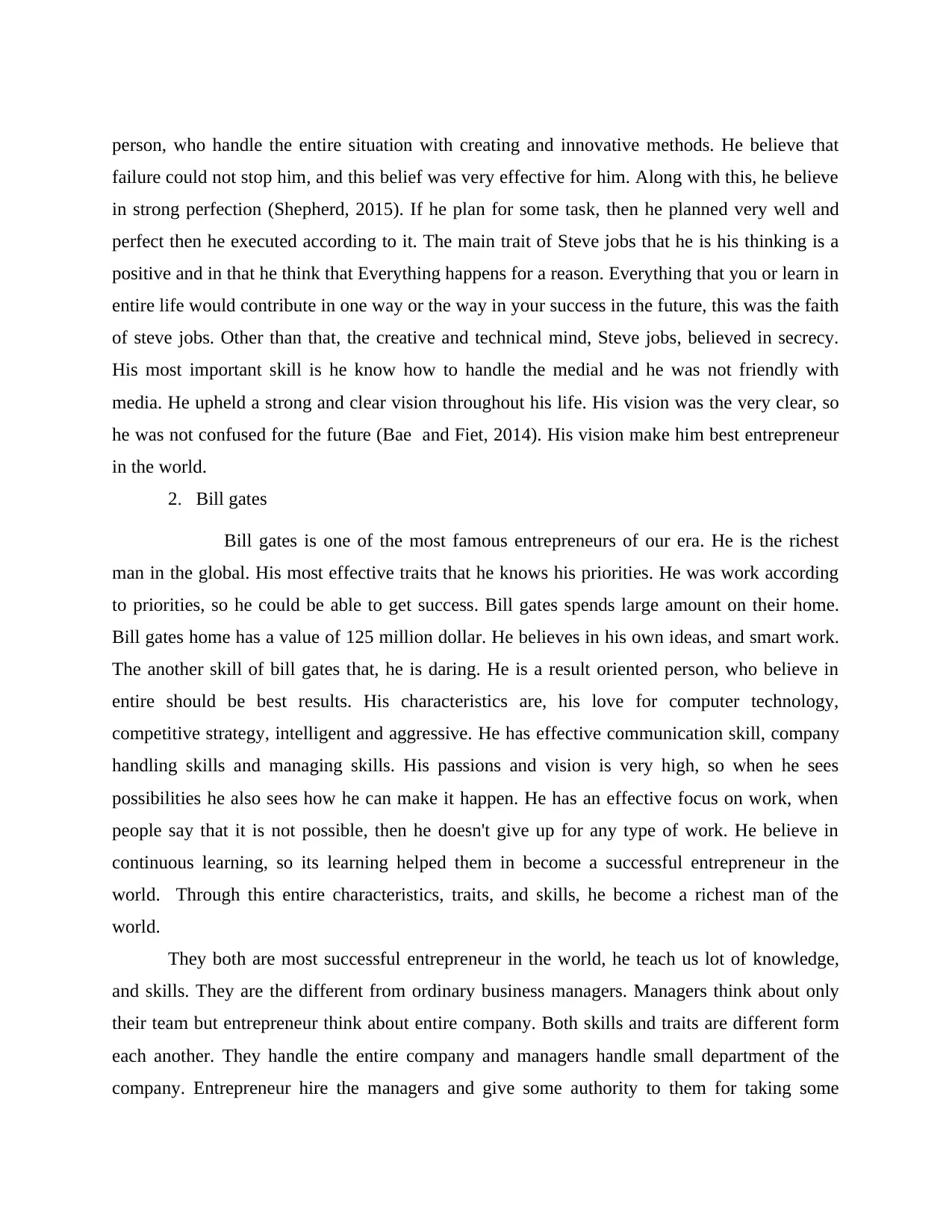
person, who handle the entire situation with creating and innovative methods. He believe that
failure could not stop him, and this belief was very effective for him. Along with this, he believe
in strong perfection (Shepherd, 2015). If he plan for some task, then he planned very well and
perfect then he executed according to it. The main trait of Steve jobs that he is his thinking is a
positive and in that he think that Everything happens for a reason. Everything that you or learn in
entire life would contribute in one way or the way in your success in the future, this was the faith
of steve jobs. Other than that, the creative and technical mind, Steve jobs, believed in secrecy.
His most important skill is he know how to handle the medial and he was not friendly with
media. He upheld a strong and clear vision throughout his life. His vision was the very clear, so
he was not confused for the future (Bae and Fiet, 2014). His vision make him best entrepreneur
in the world.
2. Bill gates
Bill gates is one of the most famous entrepreneurs of our era. He is the richest
man in the global. His most effective traits that he knows his priorities. He was work according
to priorities, so he could be able to get success. Bill gates spends large amount on their home.
Bill gates home has a value of 125 million dollar. He believes in his own ideas, and smart work.
The another skill of bill gates that, he is daring. He is a result oriented person, who believe in
entire should be best results. His characteristics are, his love for computer technology,
competitive strategy, intelligent and aggressive. He has effective communication skill, company
handling skills and managing skills. His passions and vision is very high, so when he sees
possibilities he also sees how he can make it happen. He has an effective focus on work, when
people say that it is not possible, then he doesn't give up for any type of work. He believe in
continuous learning, so its learning helped them in become a successful entrepreneur in the
world. Through this entire characteristics, traits, and skills, he become a richest man of the
world.
They both are most successful entrepreneur in the world, he teach us lot of knowledge,
and skills. They are the different from ordinary business managers. Managers think about only
their team but entrepreneur think about entire company. Both skills and traits are different form
each another. They handle the entire company and managers handle small department of the
company. Entrepreneur hire the managers and give some authority to them for taking some
failure could not stop him, and this belief was very effective for him. Along with this, he believe
in strong perfection (Shepherd, 2015). If he plan for some task, then he planned very well and
perfect then he executed according to it. The main trait of Steve jobs that he is his thinking is a
positive and in that he think that Everything happens for a reason. Everything that you or learn in
entire life would contribute in one way or the way in your success in the future, this was the faith
of steve jobs. Other than that, the creative and technical mind, Steve jobs, believed in secrecy.
His most important skill is he know how to handle the medial and he was not friendly with
media. He upheld a strong and clear vision throughout his life. His vision was the very clear, so
he was not confused for the future (Bae and Fiet, 2014). His vision make him best entrepreneur
in the world.
2. Bill gates
Bill gates is one of the most famous entrepreneurs of our era. He is the richest
man in the global. His most effective traits that he knows his priorities. He was work according
to priorities, so he could be able to get success. Bill gates spends large amount on their home.
Bill gates home has a value of 125 million dollar. He believes in his own ideas, and smart work.
The another skill of bill gates that, he is daring. He is a result oriented person, who believe in
entire should be best results. His characteristics are, his love for computer technology,
competitive strategy, intelligent and aggressive. He has effective communication skill, company
handling skills and managing skills. His passions and vision is very high, so when he sees
possibilities he also sees how he can make it happen. He has an effective focus on work, when
people say that it is not possible, then he doesn't give up for any type of work. He believe in
continuous learning, so its learning helped them in become a successful entrepreneur in the
world. Through this entire characteristics, traits, and skills, he become a richest man of the
world.
They both are most successful entrepreneur in the world, he teach us lot of knowledge,
and skills. They are the different from ordinary business managers. Managers think about only
their team but entrepreneur think about entire company. Both skills and traits are different form
each another. They handle the entire company and managers handle small department of the
company. Entrepreneur hire the managers and give some authority to them for taking some
Secure Best Marks with AI Grader
Need help grading? Try our AI Grader for instant feedback on your assignments.
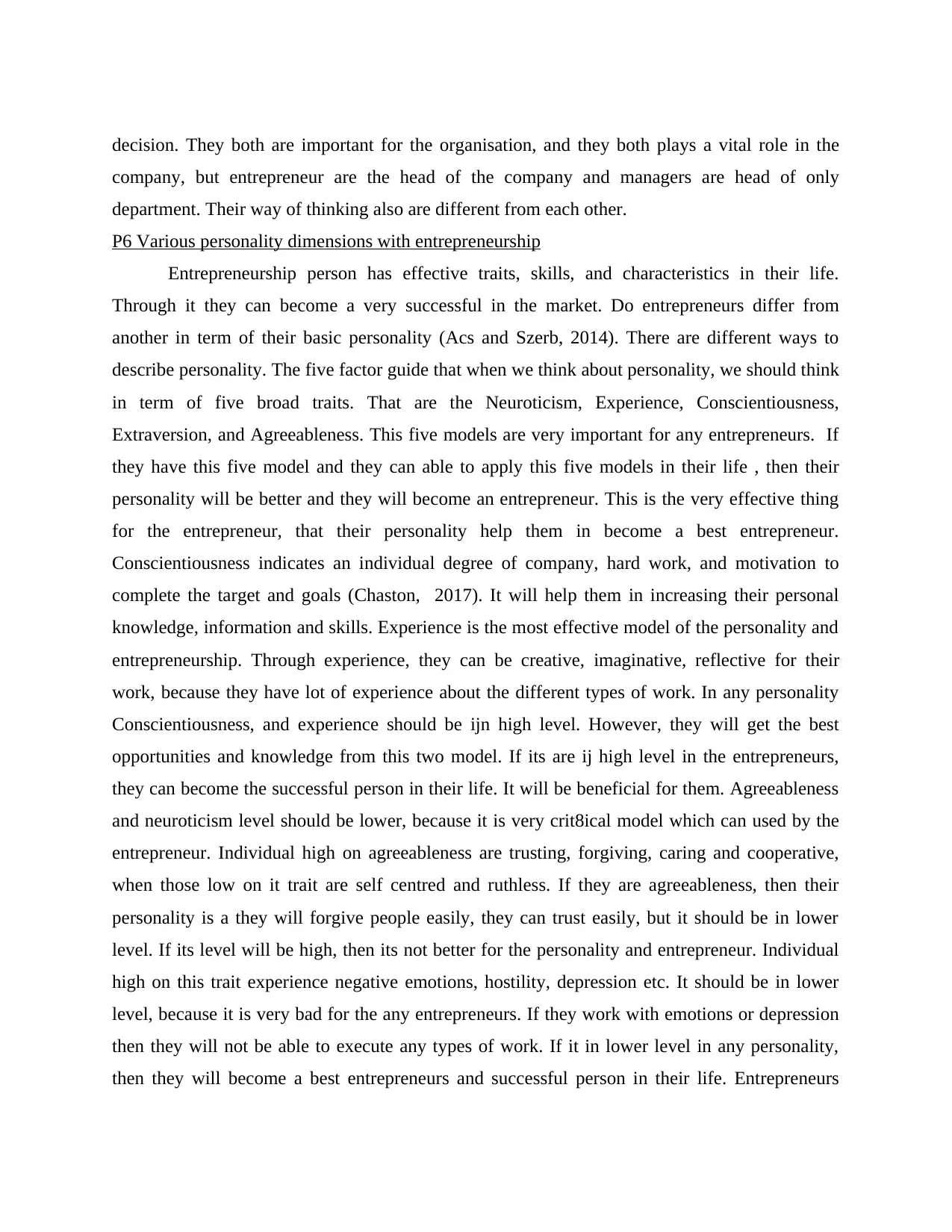
decision. They both are important for the organisation, and they both plays a vital role in the
company, but entrepreneur are the head of the company and managers are head of only
department. Their way of thinking also are different from each other.
P6 Various personality dimensions with entrepreneurship
Entrepreneurship person has effective traits, skills, and characteristics in their life.
Through it they can become a very successful in the market. Do entrepreneurs differ from
another in term of their basic personality (Acs and Szerb, 2014). There are different ways to
describe personality. The five factor guide that when we think about personality, we should think
in term of five broad traits. That are the Neuroticism, Experience, Conscientiousness,
Extraversion, and Agreeableness. This five models are very important for any entrepreneurs. If
they have this five model and they can able to apply this five models in their life , then their
personality will be better and they will become an entrepreneur. This is the very effective thing
for the entrepreneur, that their personality help them in become a best entrepreneur.
Conscientiousness indicates an individual degree of company, hard work, and motivation to
complete the target and goals (Chaston, 2017). It will help them in increasing their personal
knowledge, information and skills. Experience is the most effective model of the personality and
entrepreneurship. Through experience, they can be creative, imaginative, reflective for their
work, because they have lot of experience about the different types of work. In any personality
Conscientiousness, and experience should be ijn high level. However, they will get the best
opportunities and knowledge from this two model. If its are ij high level in the entrepreneurs,
they can become the successful person in their life. It will be beneficial for them. Agreeableness
and neuroticism level should be lower, because it is very crit8ical model which can used by the
entrepreneur. Individual high on agreeableness are trusting, forgiving, caring and cooperative,
when those low on it trait are self centred and ruthless. If they are agreeableness, then their
personality is a they will forgive people easily, they can trust easily, but it should be in lower
level. If its level will be high, then its not better for the personality and entrepreneur. Individual
high on this trait experience negative emotions, hostility, depression etc. It should be in lower
level, because it is very bad for the any entrepreneurs. If they work with emotions or depression
then they will not be able to execute any types of work. If it in lower level in any personality,
then they will become a best entrepreneurs and successful person in their life. Entrepreneurs
company, but entrepreneur are the head of the company and managers are head of only
department. Their way of thinking also are different from each other.
P6 Various personality dimensions with entrepreneurship
Entrepreneurship person has effective traits, skills, and characteristics in their life.
Through it they can become a very successful in the market. Do entrepreneurs differ from
another in term of their basic personality (Acs and Szerb, 2014). There are different ways to
describe personality. The five factor guide that when we think about personality, we should think
in term of five broad traits. That are the Neuroticism, Experience, Conscientiousness,
Extraversion, and Agreeableness. This five models are very important for any entrepreneurs. If
they have this five model and they can able to apply this five models in their life , then their
personality will be better and they will become an entrepreneur. This is the very effective thing
for the entrepreneur, that their personality help them in become a best entrepreneur.
Conscientiousness indicates an individual degree of company, hard work, and motivation to
complete the target and goals (Chaston, 2017). It will help them in increasing their personal
knowledge, information and skills. Experience is the most effective model of the personality and
entrepreneurship. Through experience, they can be creative, imaginative, reflective for their
work, because they have lot of experience about the different types of work. In any personality
Conscientiousness, and experience should be ijn high level. However, they will get the best
opportunities and knowledge from this two model. If its are ij high level in the entrepreneurs,
they can become the successful person in their life. It will be beneficial for them. Agreeableness
and neuroticism level should be lower, because it is very crit8ical model which can used by the
entrepreneur. Individual high on agreeableness are trusting, forgiving, caring and cooperative,
when those low on it trait are self centred and ruthless. If they are agreeableness, then their
personality is a they will forgive people easily, they can trust easily, but it should be in lower
level. If its level will be high, then its not better for the personality and entrepreneur. Individual
high on this trait experience negative emotions, hostility, depression etc. It should be in lower
level, because it is very bad for the any entrepreneurs. If they work with emotions or depression
then they will not be able to execute any types of work. If it in lower level in any personality,
then they will become a best entrepreneurs and successful person in their life. Entrepreneurs
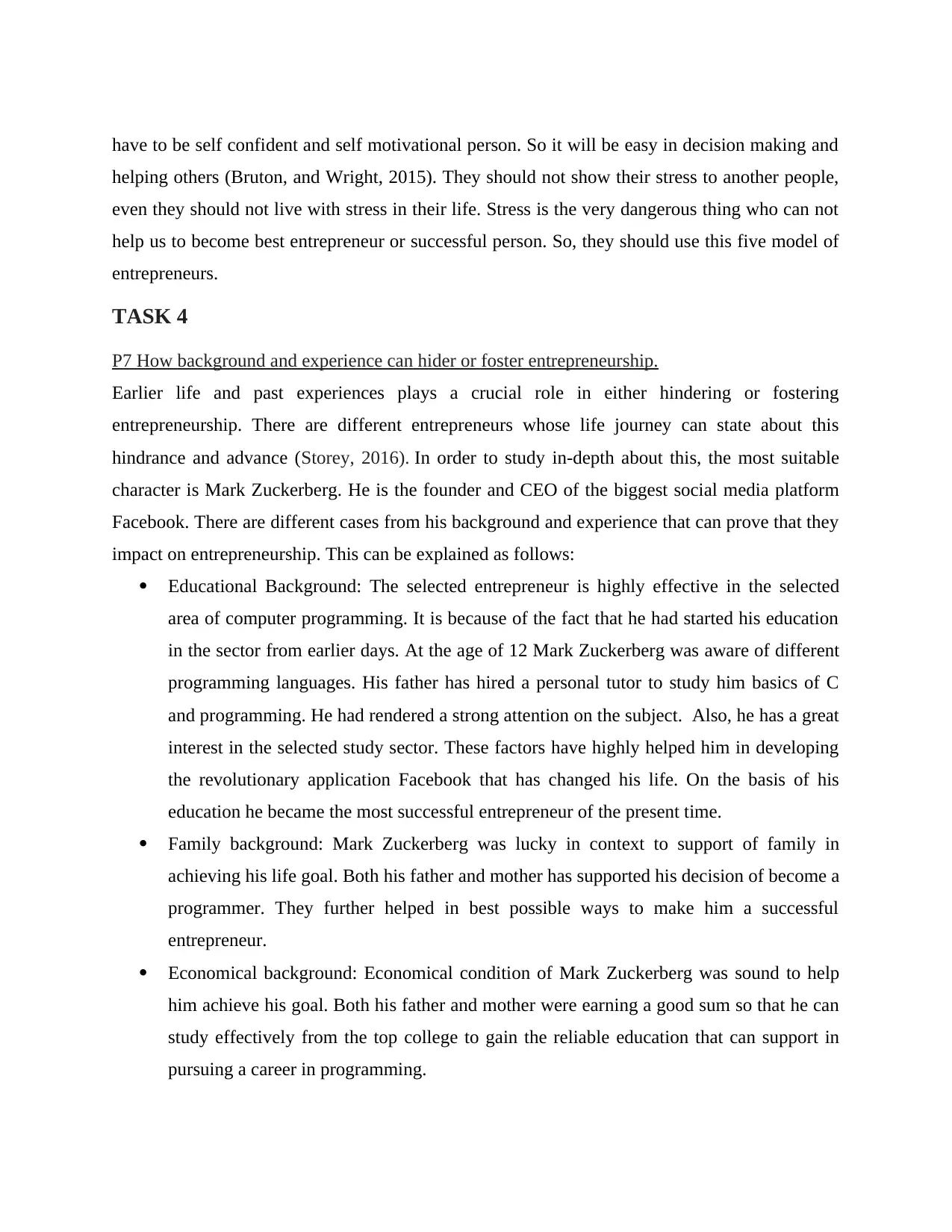
have to be self confident and self motivational person. So it will be easy in decision making and
helping others (Bruton, and Wright, 2015). They should not show their stress to another people,
even they should not live with stress in their life. Stress is the very dangerous thing who can not
help us to become best entrepreneur or successful person. So, they should use this five model of
entrepreneurs.
TASK 4
P7 How background and experience can hider or foster entrepreneurship.
Earlier life and past experiences plays a crucial role in either hindering or fostering
entrepreneurship. There are different entrepreneurs whose life journey can state about this
hindrance and advance (Storey, 2016). In order to study in-depth about this, the most suitable
character is Mark Zuckerberg. He is the founder and CEO of the biggest social media platform
Facebook. There are different cases from his background and experience that can prove that they
impact on entrepreneurship. This can be explained as follows:
Educational Background: The selected entrepreneur is highly effective in the selected
area of computer programming. It is because of the fact that he had started his education
in the sector from earlier days. At the age of 12 Mark Zuckerberg was aware of different
programming languages. His father has hired a personal tutor to study him basics of C
and programming. He had rendered a strong attention on the subject. Also, he has a great
interest in the selected study sector. These factors have highly helped him in developing
the revolutionary application Facebook that has changed his life. On the basis of his
education he became the most successful entrepreneur of the present time.
Family background: Mark Zuckerberg was lucky in context to support of family in
achieving his life goal. Both his father and mother has supported his decision of become a
programmer. They further helped in best possible ways to make him a successful
entrepreneur.
Economical background: Economical condition of Mark Zuckerberg was sound to help
him achieve his goal. Both his father and mother were earning a good sum so that he can
study effectively from the top college to gain the reliable education that can support in
pursuing a career in programming.
helping others (Bruton, and Wright, 2015). They should not show their stress to another people,
even they should not live with stress in their life. Stress is the very dangerous thing who can not
help us to become best entrepreneur or successful person. So, they should use this five model of
entrepreneurs.
TASK 4
P7 How background and experience can hider or foster entrepreneurship.
Earlier life and past experiences plays a crucial role in either hindering or fostering
entrepreneurship. There are different entrepreneurs whose life journey can state about this
hindrance and advance (Storey, 2016). In order to study in-depth about this, the most suitable
character is Mark Zuckerberg. He is the founder and CEO of the biggest social media platform
Facebook. There are different cases from his background and experience that can prove that they
impact on entrepreneurship. This can be explained as follows:
Educational Background: The selected entrepreneur is highly effective in the selected
area of computer programming. It is because of the fact that he had started his education
in the sector from earlier days. At the age of 12 Mark Zuckerberg was aware of different
programming languages. His father has hired a personal tutor to study him basics of C
and programming. He had rendered a strong attention on the subject. Also, he has a great
interest in the selected study sector. These factors have highly helped him in developing
the revolutionary application Facebook that has changed his life. On the basis of his
education he became the most successful entrepreneur of the present time.
Family background: Mark Zuckerberg was lucky in context to support of family in
achieving his life goal. Both his father and mother has supported his decision of become a
programmer. They further helped in best possible ways to make him a successful
entrepreneur.
Economical background: Economical condition of Mark Zuckerberg was sound to help
him achieve his goal. Both his father and mother were earning a good sum so that he can
study effectively from the top college to gain the reliable education that can support in
pursuing a career in programming.
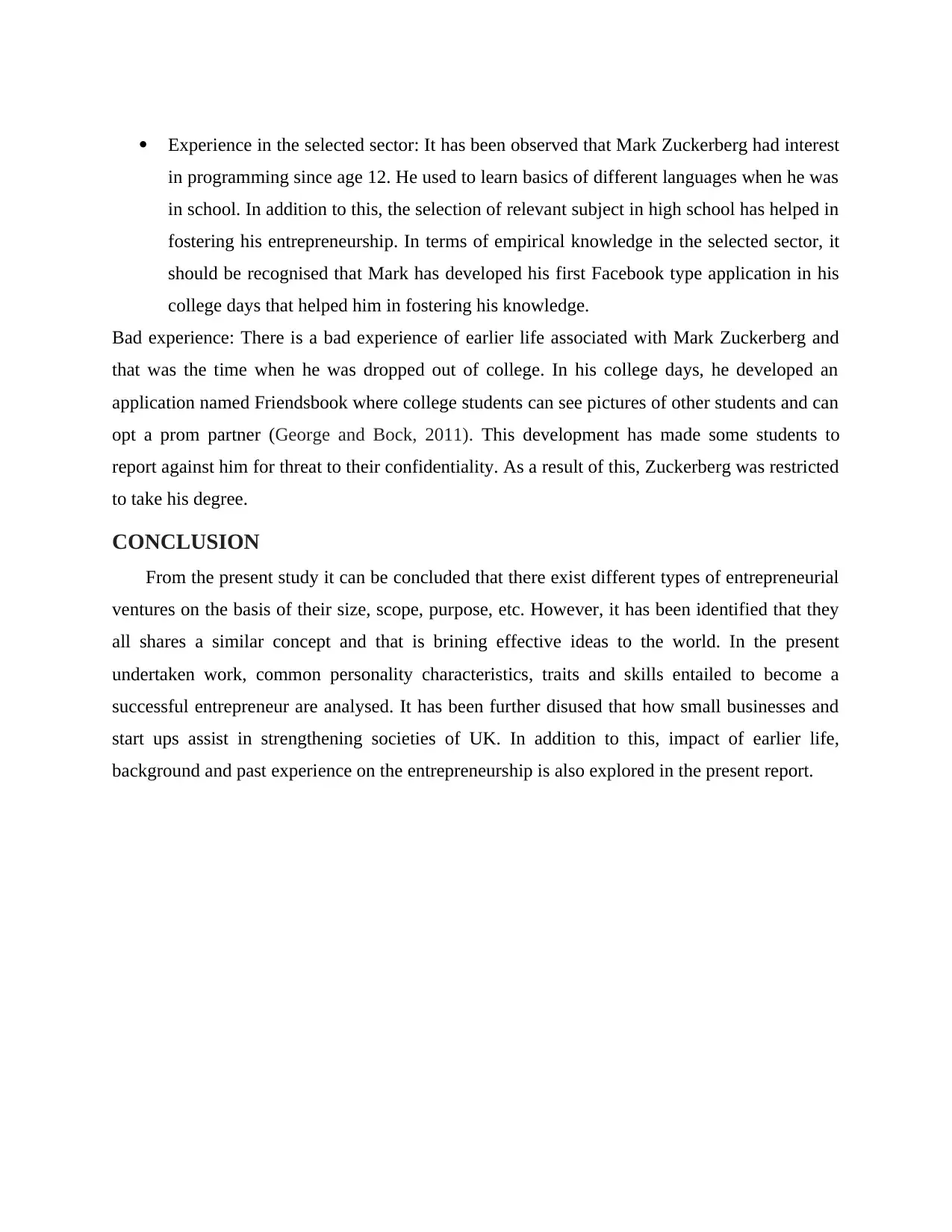
Experience in the selected sector: It has been observed that Mark Zuckerberg had interest
in programming since age 12. He used to learn basics of different languages when he was
in school. In addition to this, the selection of relevant subject in high school has helped in
fostering his entrepreneurship. In terms of empirical knowledge in the selected sector, it
should be recognised that Mark has developed his first Facebook type application in his
college days that helped him in fostering his knowledge.
Bad experience: There is a bad experience of earlier life associated with Mark Zuckerberg and
that was the time when he was dropped out of college. In his college days, he developed an
application named Friendsbook where college students can see pictures of other students and can
opt a prom partner (George and Bock, 2011). This development has made some students to
report against him for threat to their confidentiality. As a result of this, Zuckerberg was restricted
to take his degree.
CONCLUSION
From the present study it can be concluded that there exist different types of entrepreneurial
ventures on the basis of their size, scope, purpose, etc. However, it has been identified that they
all shares a similar concept and that is brining effective ideas to the world. In the present
undertaken work, common personality characteristics, traits and skills entailed to become a
successful entrepreneur are analysed. It has been further disused that how small businesses and
start ups assist in strengthening societies of UK. In addition to this, impact of earlier life,
background and past experience on the entrepreneurship is also explored in the present report.
in programming since age 12. He used to learn basics of different languages when he was
in school. In addition to this, the selection of relevant subject in high school has helped in
fostering his entrepreneurship. In terms of empirical knowledge in the selected sector, it
should be recognised that Mark has developed his first Facebook type application in his
college days that helped him in fostering his knowledge.
Bad experience: There is a bad experience of earlier life associated with Mark Zuckerberg and
that was the time when he was dropped out of college. In his college days, he developed an
application named Friendsbook where college students can see pictures of other students and can
opt a prom partner (George and Bock, 2011). This development has made some students to
report against him for threat to their confidentiality. As a result of this, Zuckerberg was restricted
to take his degree.
CONCLUSION
From the present study it can be concluded that there exist different types of entrepreneurial
ventures on the basis of their size, scope, purpose, etc. However, it has been identified that they
all shares a similar concept and that is brining effective ideas to the world. In the present
undertaken work, common personality characteristics, traits and skills entailed to become a
successful entrepreneur are analysed. It has been further disused that how small businesses and
start ups assist in strengthening societies of UK. In addition to this, impact of earlier life,
background and past experience on the entrepreneurship is also explored in the present report.
Paraphrase This Document
Need a fresh take? Get an instant paraphrase of this document with our AI Paraphraser
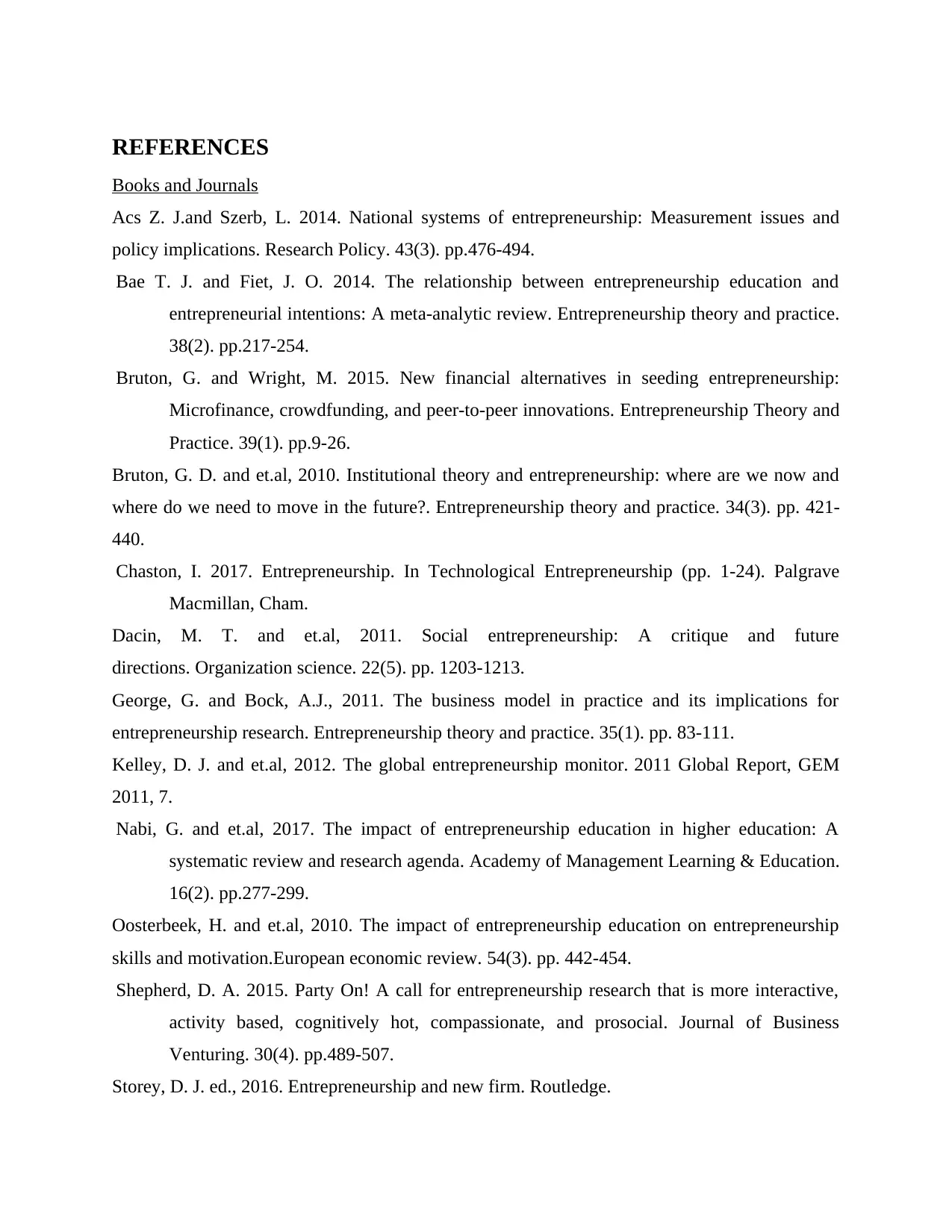
REFERENCES
Books and Journals
Acs Z. J.and Szerb, L. 2014. National systems of entrepreneurship: Measurement issues and
policy implications. Research Policy. 43(3). pp.476-494.
Bae T. J. and Fiet, J. O. 2014. The relationship between entrepreneurship education and
entrepreneurial intentions: A meta‐analytic review. Entrepreneurship theory and practice.
38(2). pp.217-254.
Bruton, G. and Wright, M. 2015. New financial alternatives in seeding entrepreneurship:
Microfinance, crowdfunding, and peer‐to‐peer innovations. Entrepreneurship Theory and
Practice. 39(1). pp.9-26.
Bruton, G. D. and et.al, 2010. Institutional theory and entrepreneurship: where are we now and
where do we need to move in the future?. Entrepreneurship theory and practice. 34(3). pp. 421-
440.
Chaston, I. 2017. Entrepreneurship. In Technological Entrepreneurship (pp. 1-24). Palgrave
Macmillan, Cham.
Dacin, M. T. and et.al, 2011. Social entrepreneurship: A critique and future
directions. Organization science. 22(5). pp. 1203-1213.
George, G. and Bock, A.J., 2011. The business model in practice and its implications for
entrepreneurship research. Entrepreneurship theory and practice. 35(1). pp. 83-111.
Kelley, D. J. and et.al, 2012. The global entrepreneurship monitor. 2011 Global Report, GEM
2011, 7.
Nabi, G. and et.al, 2017. The impact of entrepreneurship education in higher education: A
systematic review and research agenda. Academy of Management Learning & Education.
16(2). pp.277-299.
Oosterbeek, H. and et.al, 2010. The impact of entrepreneurship education on entrepreneurship
skills and motivation.European economic review. 54(3). pp. 442-454.
Shepherd, D. A. 2015. Party On! A call for entrepreneurship research that is more interactive,
activity based, cognitively hot, compassionate, and prosocial. Journal of Business
Venturing. 30(4). pp.489-507.
Storey, D. J. ed., 2016. Entrepreneurship and new firm. Routledge.
Books and Journals
Acs Z. J.and Szerb, L. 2014. National systems of entrepreneurship: Measurement issues and
policy implications. Research Policy. 43(3). pp.476-494.
Bae T. J. and Fiet, J. O. 2014. The relationship between entrepreneurship education and
entrepreneurial intentions: A meta‐analytic review. Entrepreneurship theory and practice.
38(2). pp.217-254.
Bruton, G. and Wright, M. 2015. New financial alternatives in seeding entrepreneurship:
Microfinance, crowdfunding, and peer‐to‐peer innovations. Entrepreneurship Theory and
Practice. 39(1). pp.9-26.
Bruton, G. D. and et.al, 2010. Institutional theory and entrepreneurship: where are we now and
where do we need to move in the future?. Entrepreneurship theory and practice. 34(3). pp. 421-
440.
Chaston, I. 2017. Entrepreneurship. In Technological Entrepreneurship (pp. 1-24). Palgrave
Macmillan, Cham.
Dacin, M. T. and et.al, 2011. Social entrepreneurship: A critique and future
directions. Organization science. 22(5). pp. 1203-1213.
George, G. and Bock, A.J., 2011. The business model in practice and its implications for
entrepreneurship research. Entrepreneurship theory and practice. 35(1). pp. 83-111.
Kelley, D. J. and et.al, 2012. The global entrepreneurship monitor. 2011 Global Report, GEM
2011, 7.
Nabi, G. and et.al, 2017. The impact of entrepreneurship education in higher education: A
systematic review and research agenda. Academy of Management Learning & Education.
16(2). pp.277-299.
Oosterbeek, H. and et.al, 2010. The impact of entrepreneurship education on entrepreneurship
skills and motivation.European economic review. 54(3). pp. 442-454.
Shepherd, D. A. 2015. Party On! A call for entrepreneurship research that is more interactive,
activity based, cognitively hot, compassionate, and prosocial. Journal of Business
Venturing. 30(4). pp.489-507.
Storey, D. J. ed., 2016. Entrepreneurship and new firm. Routledge.

Storey, D. J. ed., 2016. Entrepreneurship and new firm. Routledge.
Taylor, W., Casey, R. and Oviatt, B. M., 2016. A Note on Entrepreneurship within Korean
Enclaves in Atlanta.
Taylor, W., Casey, R. and Oviatt, B. M., 2016. A Note on Entrepreneurship within Korean
Enclaves in Atlanta.
Taylor, W., Casey, R. and Oviatt, B. M., 2016. A Note on Entrepreneurship within Korean
Enclaves in Atlanta.
Taylor, W., Casey, R. and Oviatt, B. M., 2016. A Note on Entrepreneurship within Korean
Enclaves in Atlanta.
1 out of 15
Related Documents
Your All-in-One AI-Powered Toolkit for Academic Success.
+13062052269
info@desklib.com
Available 24*7 on WhatsApp / Email
![[object Object]](/_next/static/media/star-bottom.7253800d.svg)
Unlock your academic potential
© 2024 | Zucol Services PVT LTD | All rights reserved.





